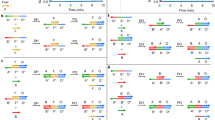Abstract
In the field of DNA computing, more and more efforts are made for constructing molecular machines made of DNA that work in vitro or in vivo. States of some of those machines are represented by their conformations, such as hairpin and bulge loops, and state transitions are realized by conformational changes, in which such loops are opened. The ultimate goal of this study is to implement not only independent molecular machines, but also networks of interacting machines, called chain reaction systems, where a conformational change of one machine triggers a conformational change of another machine in a cascaded manner. A chain reaction system would result in a much larger computational power than a single machine in the number of states and in the complexity of computation. As a simple example, we propose a general-purpose molecular system consisting of logical gates and sensors. As a more complex example, we present a new idea of constructing a DNA automaton by a chain reaction system, which can have an arbitrary number of states.
Preview
Unable to display preview. Download preview PDF.
Similar content being viewed by others
References
Uejima, H., et al.: Secondary Structure Design of Multi-state DNA Machines Based on Sequential Structure Transitions. In: Chen, J., Reif, J.H. (eds.) DAN 2003. LNCS, vol. 2943, pp. 74–85. Springer, Heidelberg (2004)
Kubota, M., et al.: Branching DNA Machines Based on Transitions of Hairpin Structures. In: Proceedings of the 2003 Congress on Evolutionary Computation (CEC 2003), pp. 2542–2548 (2003)
Takahashi, K., et al.: On Computation of Minimum Free Energy and Partition Function of Multiple Nucleic Acid Sequences. In: FIT 2004, Forum on Information Science and Technology, pp. 91–92 (2004)
Dirks, R.M., et al.: Paradigms for computational nucleic acid design. Nucleic Acids Res. 32, 1392–1403 (2004)
Arita, M., et al.: DNA Sequence Design Using Templates. New Generation Computing 20, 263–277 (2002)
Kobayashi, S., et al.: On Template Method for DNA Sequence Design. In: Hagiya, M., Ohuchi, A. (eds.) DNA 2002. LNCS, vol. 2568, pp. 205–214. Springer, Heidelberg (2003)
Hofacker, I.L.: Vienna RNA secondary structure server. Nucleic Acids Res. 31, 3429–3431 (2003)
Ogihara, M., et al.: Simulating Boolean circuits on a DNA computer. Algorithmica 25, 239–250 (1999)
Amos, M., et al.: DNA simulation of Boolean circuits. In: Proc. of the Third Annual Conference on Genetic Programming, pp. 679–683. Morgan Kaufmann, San Francisco (1998)
Carbone, A., et al.: Circuits and programmable self-assembling DNA structures. PNAS 99, 12577–12582 (2002)
Yurke, B., et al.: A DNA-fuelled molecular machine made of DNA. Nature 406, 605–608 (2000)
Seelig, G., et al.: DNA Hybridization Catalysts and Catalyst Circuits. In: DNA10, Tenth International Meeting on DNA Based Computers, Preliminary Proceedings, pp. 202–213 (2004)
Gao, Y., et al.: DNA implementation of nondeterminism. In: DNA Based Computers III. DIMACS Series in Discrete Mathematics and Theoretical Computer Science, vol. 48, pp. 137–148 (1999)
Garzon, M., et al.: In vitro Implementation of Finite-State Machines. In: Wood, D., Yu, S. (eds.) WIA 1997. LNCS, vol. 1436, pp. 56–74. Springer, Heidelberg (1998)
Benenson, Y., et al.: Programmable and autonomous computing machine made of biomolecules. Nature 414, 430–434 (2001)
Benenson, Y., et al.: An autonomous molecular computer for logical control of gene expression. Nature 429, 423–429 (2004)
Takahashi, K., et al.: Preliminary Experiments on Hairpin Structure Dissociation for Constructing Robust DNA Machines. In: Zhang, J., He, J.-H., Fu, Y. (eds.) CIS 2004. LNCS, vol. 3314, pp. 285–290. Springer, Heidelberg (2004)
Takahashi, K., et al.: Photo- and Thermo-Regulation of DNA Nanomachines (submitted)
Dirks, R.M., et al.: Triggered amplification by hybridization chain reaction. PNAS 101, 15275–15278 (2004)
Author information
Authors and Affiliations
Editor information
Editors and Affiliations
Rights and permissions
Copyright information
© 2006 Springer-Verlag Berlin Heidelberg
About this paper
Cite this paper
Takahashi, K., Yaegashi, S., Kameda, A., Hagiya, M. (2006). Chain Reaction Systems Based on Loop Dissociation of DNA. In: Carbone, A., Pierce, N.A. (eds) DNA Computing. DNA 2005. Lecture Notes in Computer Science, vol 3892. Springer, Berlin, Heidelberg. https://doi.org/10.1007/11753681_27
Download citation
DOI: https://doi.org/10.1007/11753681_27
Publisher Name: Springer, Berlin, Heidelberg
Print ISBN: 978-3-540-34161-1
Online ISBN: 978-3-540-34165-9
eBook Packages: Computer ScienceComputer Science (R0)




